Warmest years and hiatuses: Just a little irrelevant
Short-term indicators don't tell the most meaningful stories on climate change
By Richard Black
Share
Last updated:
By Richard Black, ECIU Director
As the Danish saying goes, it’s hard to make predictions – especially about the future.
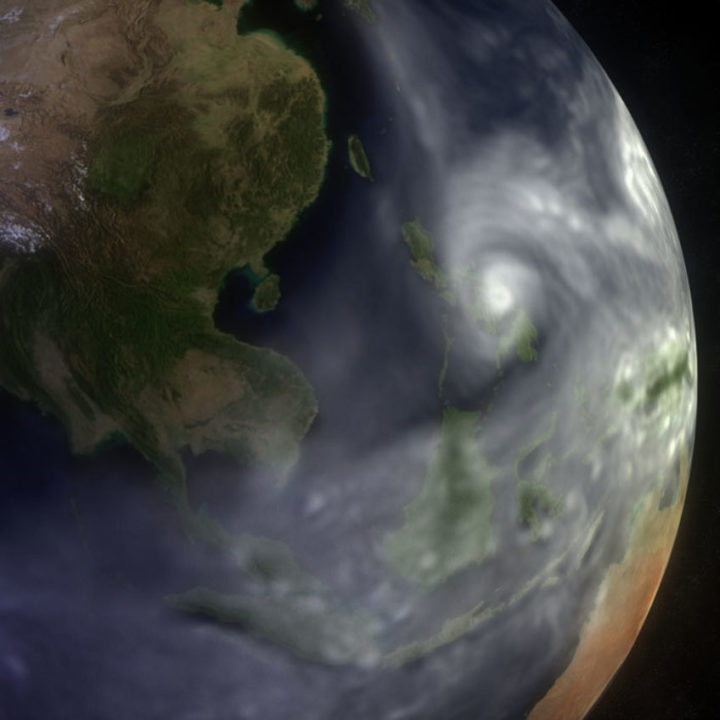
But I’ll take a punt: the main institutions recording global temperatures will release their first analyses of 2016 this Wednesday, and they will say it was the warmest year on record.
They’ll say 2016 was around 0.8ºC, maybe 0.9ºC, warmer than the average temperature during the years 1961-1990. And if you convert that into what we conventionally regard as ‘global warming’ – the temperature rise since humankind started burning fossil fuels on an industrial scale – we’re looking at around 1.2, maybe 1.3ºC.
I’ll make another prediction with little fear of contradiction: the announcement will spark a tediously familiar dialogue of the deaf between proponents on either side of what’s equally tediously called the ‘global warming debate’.
The green movement will say it’s ‘proof’ that global warming and its much larger cousin climate change are happening, and that the world is frying as a result.
Their opponents in the brown movement will revive the ‘global warming hiatus’ meme (doubtless highlighting the UAH satellite temperature record that typically shows lower rates of warming than the land-based record), blame it all on the recent El Nino event, and assert that scientists have been systematically cooking historical data to make sure the books show rising temperatures.
Which is all a bit yawn-worthy, frankly.
Pressing 'pause'
As I pointed out when this came round a couple of years ago, one hot year doesn’t ‘prove’ global warming, just as one cool year doesn’t disprove it. Of course both news journalism and the battle for dominance of the ‘global warming debate’ both demand that the new stuff is written about and interpreted – but that doesn’t mean the new stuff is especially important.
Let’s look at the ‘global warming hiatus’ (or ‘pause’) argument a little more closely. Because there are three separate issues that mean it’s not something that needs to be given priority.
Firstly, science usually produces data and trends that aren’t entirely certain, but which lie within margins of error – if you prefer, within confidence limits.
And within confidence limits, the Intergovernmental Panel on Climate Change (IPCC) concluded in its 2013/14 assessment report, it’s impossible to tell whether there was a hiatus or not. The most likely conclusion was that temperatures did keep rising in the period 1998-2012, but at a lower pace than in the preceding few decades.
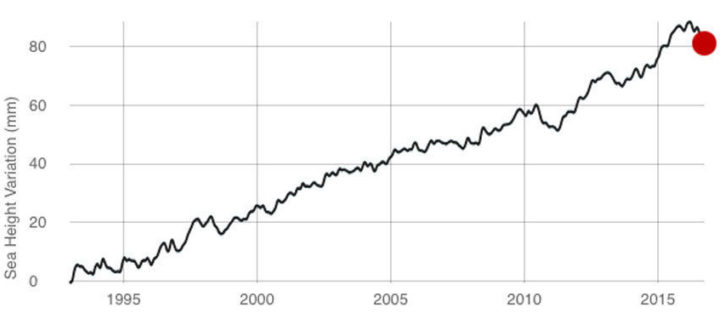
But given the error margins, it was just possible that there had been a complete pause, and equally possible that there had been no slowdown at all.
The logical outcome: Get more years of measurement, and improve analysis of data already gathered. And in the meantime, don’t make sweeping conclusions about what might or might not be happening.
Now we have both the extra years and the better analysis. And they suggest that the pause didn’t really happen.
The second factor is that the choice of 1998 as the starting year for ‘pause’ analysis was misleading, as it marked one of the strongest El Nino events on record.
Of course, after an event that boosted the global average surface temperature by half a degree or so, the next few years were likely to see lower temperatures; and they did. Which is why the focus on 1998, promoted by climate sceptics, was so disingenuous.
This week we’ll doubtless see sceptics arguing that the 2016 record only came about because of the most recent El Nino. Which, given the history, is doubly disingenuous.
Melting arguments
The third, and by far most important, argument against taking the ‘hiatus’ argument too seriously is that warming of the Earth’s surface is only one aspect of climate change. Often the terms ‘global warming’ and ‘climate change’ are used interchangeably – full disclosure, I failed on this as badly as anyone during my early days covering the issue for the BBC – but they shouldn’t be.
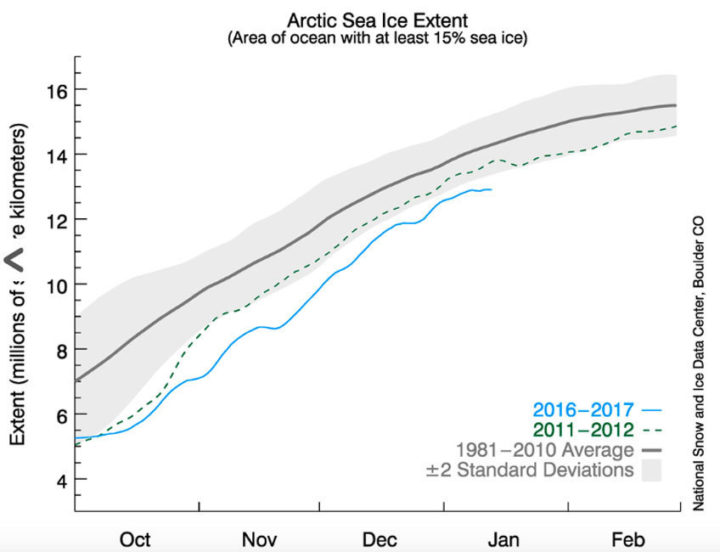
Recall that only about 1% of the additional energy trapped in the Earth system goes into warming the atmosphere, and you can see that surface temperature measurements tell us relatively little about how the overall pace of energy-trapping may be changing, and may miss out much about its consequences.
The vast fraction of that trapped energy goes into warming the ocean, and some into melting land-based ice, thus raising sea level. Ocean currents may change. Mountain glaciers melt. The sea’s acidity/alkalinity changes through absorbing more carbon dioxide. Many of these processes feed back, altering the rate of warming.
So ‘climate change’ is both much more complex and much more important than ‘global warming’. As has been acknowledged for decades, which is why both the names of both the Intergovernmental Panel on… and United Nations Framework Convention on… are completed by the phrase ‘Climate Change’, not ‘Global Warming’.
While there may or may not have been a hiatus in the rate of rise in surface warming, the reality is that if you look across the full range of climate change indicators, there is no evidence of a hiatus.
Sea level rise? Continuing, probably accelerating. Shrinking of mountain glaciers? Continuing. Shrinking of Arctic sea ice? No sign of any hiatus.
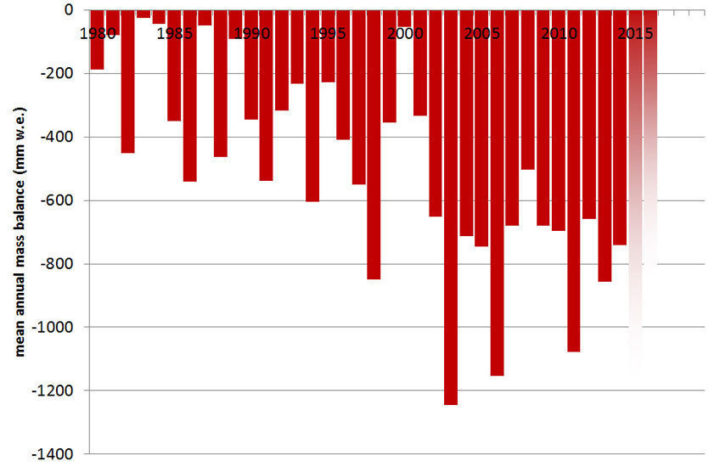
And in the real world...
And when it comes to policymaking, none of this really matters.
For example, the UK government will shortly publish its latest Climate Change Risk Assessment (CCRA). The aim is to give policymakers at national and local level, businesses, and the public a look at what climate change probably means for the century ahead, and how they can prepare.
Advice given by the Committee on Climate Change, the statutory advisors, suggests the CCRA will probably highlight a need for immediate action to protect communities against flooding and prepare health facilities for climate impacts ahead, near-term increased risks to water supplies and other issues concerning for our food supply, and a need for research on invasive pests and new diseases.
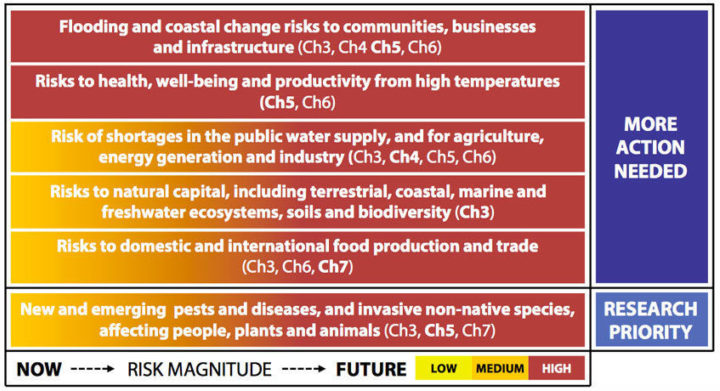
And of course, the long-term, averaged-out projections are what matter. Is Hull city centre liable to flood in the winter of 2054, or would it be 2058? Haven’t a clue – and nor does anyone else. Is 2036 the year when we might expect Chikungunya to establish itself in the UK, or would that be 2037? No idea.
But it doesn’t matter. If you’re planning new flood defences (say) for Hull, you’re planning for both an average and a worst case over an extended period up to, perhaps, a century. The same is true for businesses, whether they’re considering how resilient their supply chain is to climate impacts or whether their business model itself will survive in a world heading towards 2ºC-plus of global warming.
So policymaking is a risk management exercise in a context where precise forecasting of those risks is impossible. On a timescale of many decades, and where other factors highly relevant to decision-making are also unpredictable.
It’s not that weird. People make decisions with far-reaching consequences on investments, job changes, even life relationships, on inexact information – and hey, the world’s still turning.
But it does make obsessing about a single warm/cold/wet/dry year, or about whether one small part of climate change is taking a rest, somewhat odd – and largely irrelevant.
Share